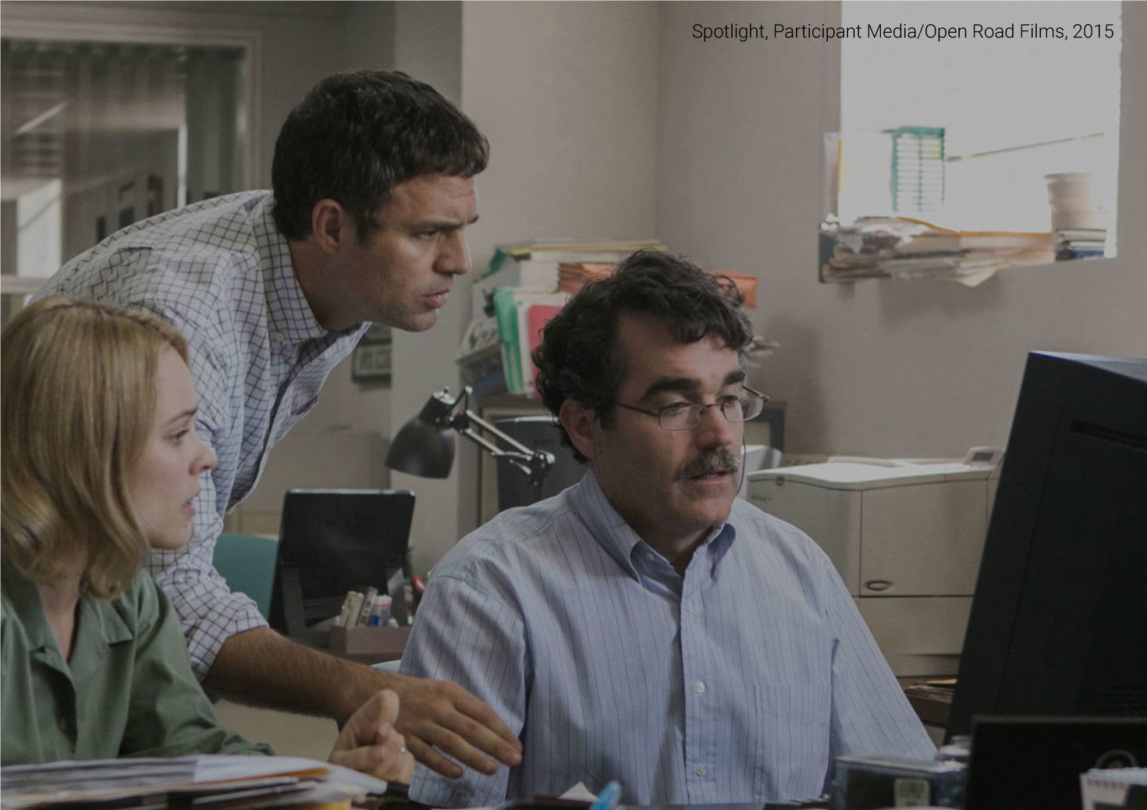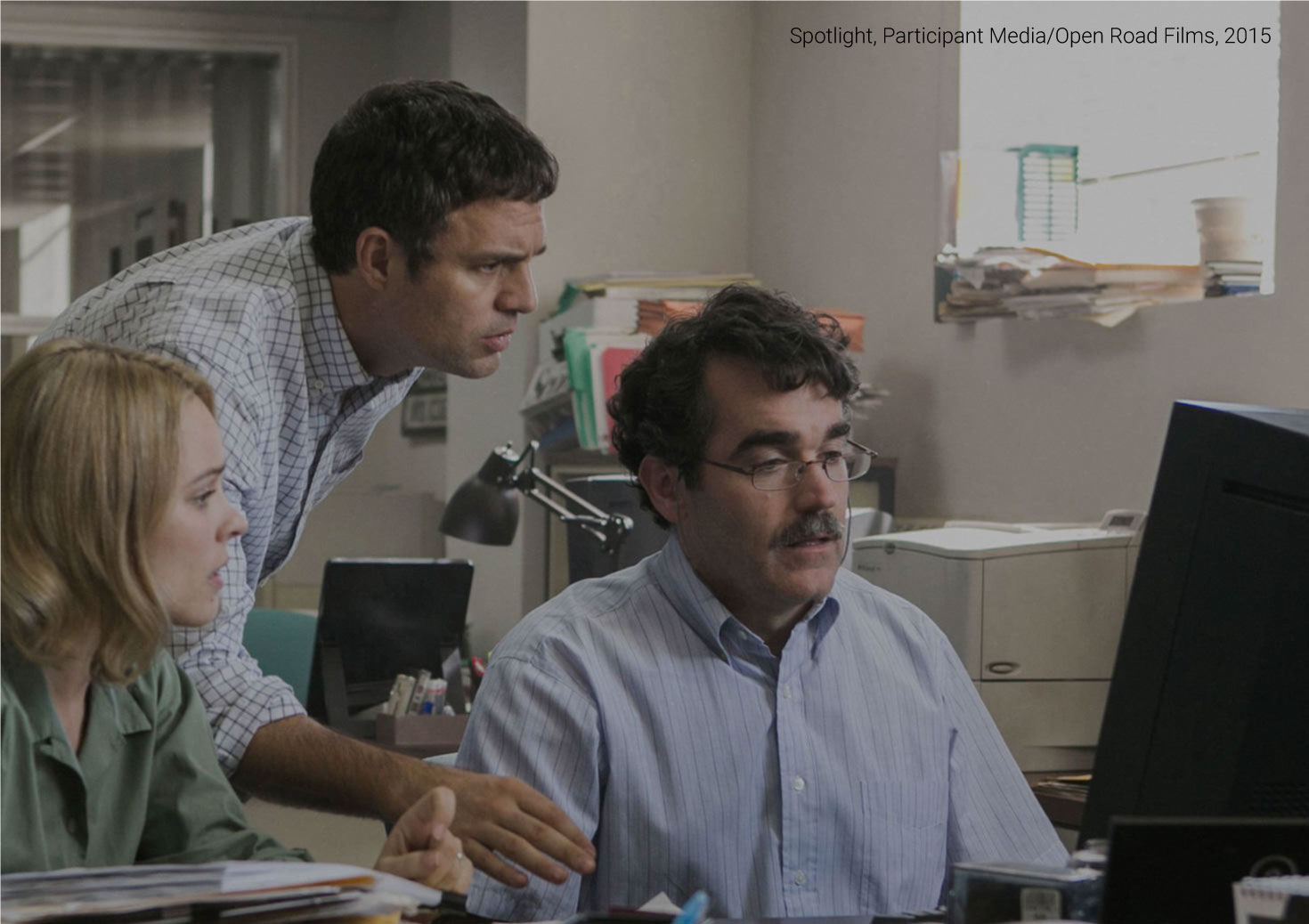
More Info
Spotlight, Participant Media/Open Road Films, 2015
Spotlight, Participant Media/Open Road Films, 2015
Upon Reflection: Spotlight — a special resonance
This column is a periodic series of personal reflections on journalism, news literacy, education and related topics by NLP’s founder and CEO, Alan C. Miller. Columns are posted at 10 a.m. ET every other Thursday.


Photo Credit: Spotlight, Participant Media/Open Road Films, 2015
The upcoming Academy Awards ceremony on Sunday offers an opportune moment to reflect on my favorite film about journalism: Spotlight, which won the best picture Oscar in 2016.
The movie — whose title comes from the name of The Boston Globe’s investigative team — depicts how reporters and editors at the paper uncovered decades of sexual abuse by local Roman Catholic priests and the Boston Archdiocese’s role in covering it up.
More than five years after its release, it continues to resonate with me for deeply personal reasons. I spent most of my 29 years as a newspaper reporter doing the kind of dogged, challenging and impactful investigative work that Spotlight captures with such painstaking authenticity. This gave me a particular appreciation for the lengths to which the filmmakers went to get it so right — and how they were able to make such an engrossing and entertaining movie in the process.
Moreover, it brought attention to journalism’s watchdog role — holding the powerful accountable — and the importance of a local newspaper to its community at a time when journalism was increasingly under fire and many local publications were failing. It portrayed the reporters and editors as heroic, though fallible, and reflected the essential role of principled sources and courageous victims to bring vital, if excruciatingly painful, truths to light.
In addition, I have a unique connection to this movie: Marty Baron (powerfully portrayed by Liev Schreiber), who set the investigation in motion on his first day as the Globe’s top editor and oversaw it with steely determination, is a friend and former colleague. For months, I shared in his excitement as he told me about the film’s production and launch.
I first saw Spotlight in 2015 at an investigative journalism film festival that featured a discussion with Baron, some of his former Globe colleagues, director Tom McCarthy and McCarthy’s co-screenwriter, Josh Singer. I sat between two longtime friends — Chuck Lewis, the founder of the Center for Public Integrity and the executive editor of American University’s Investigative Reporting Workshop, and James Grimaldi, an investigative reporter at The Wall Street Journal and a two-time Pulitzer Prize winner.
Throughout the screening, the three of us shared chuckles of recognition — when reporter Michael Rezendes (Mark Ruffalo) first makes his edgy inquisitiveness felt; as Sacha Pfeiffer (Rachel McAdams) and her colleague traipse from door to door in Boston’s blue-collar neighborhoods in search of victims who will share their stories; and as the Spotlight team members scour yellowing clips in the newspaper’s library (the morgue, in newsroom parlance) and pore over records on microfilm.
During the panel discussion and in conversations at a reception following the screening, I was struck both by McCarthy’s and Singer’s abiding belief in the power of journalism and by their own relentless reporting to uncover the story behind the story.
This included a half-dozen trips to Boston to interview not just the Globe journalists, but also the attorneys and sources who contributed to the paper’s investigation. Before Baron left Boston to begin his brilliant eight-year tenure as executive editor of The Washington Post in 2013, Singer sought him out yet again.
“I have nothing more to tell you,” Baron told him. “I’m tapped out.”
Most impressively, it was the screenwriters who unearthed a 1993 newspaper report that is the linchpin for one of the film’s most compelling scenes.
In the movie, an attorney for multiple victims of sexual abuse tells members of the Spotlight team that he had informed the paper nearly a decade earlier about accusations against 20 priests in the Boston Archdiocese. He said the paper buried the story in the Metro section and never followed up. Pfeiffer later finds the story and shares it with the head of the Spotlight team, Walter “Robby” Robinson (Michael Keaton), leading the journalists to reflect on their own culpability in not previously unearthing the Archdiocese’s pervasive pattern of simply transferring accused priests to a new parish.
In reality, McCarthy and Singer were the ones who found that story, tucked in the Globe’s clip files, after talking to the attorney, Roderick MacLeish Jr. They presented it to Robinson, who had been Metro editor when it was published. “He was stunned,” Baron recalled in a 2016 event at American University. “He didn’t remember the story.”
There is another reason that Spotlight remains special to me.
In 2003, as the Globe continued to publish reports revealing the vastly greater scope of abuse by priests (the film covers the reporters’ actions leading up to the paper’s initial story in January 2002, with some dramatic license), a colleague and I at the Los Angeles Times were investigating another long-untold story involving another highly respected institution.
Through hundreds of interviews and thousands of pages of documents obtained under the Freedom of Information Act, Kevin Sack and I documented how the Marine Corps’ Harrier jump jet, which can take off and land vertically, had been, for decades, the most dangerous plane in the U.S. military for noncombat accidents. Crashes destroyed more than a third of the fleet, and 45 pilots, including some of the Marines’ finest, were killed.
We tracked down survivors of all 45 pilots, interviewing widows, fathers, mothers, brothers and sisters and creating a virtual memorial wall to honor those who paid the ultimate price in a plane that pilots called “the widow-maker.” As our four-part series, “The Vertical Vision,” revealed, this was the first of three aircraft for which the Marines would pay an enormous price in blood and treasure with minimal distinctive benefit in combat.
On May 29, 2003, Sack, our editors and I were deeply honored to join Baron and the Spotlight team and the other winners of that year’s Pulitzer Prizes at an awards lunch at Columbia University in New York City. The Spotlight team won the Public Service prize; ours was for National Reporting.
Nearly 13 years later, I found myself rooting for McCarthy and Singer — and, by extension, Baron and the Globe team — as I watched the Academy Awards. It was thrilling to see the presentations begin with McCarthy and Singer honored for best screenplay and culminate with Spotlight’s award for best picture.
In accepting the screenwriting award, McCarthy, as usual, found just the right words.
“We made this film for all the journalists who have and continue to hold the powerful accountable,” he said. “And for the survivors whose courage and will to overcome is really an inspiration to all.”
Alan C. Miller is the founder and CEO of the News Literacy Project. He was a reporter for the Los Angeles Times for 21 years. Marty Baron worked at the paper for 17 years.
Read more from this series:
- Apr. 8: The 19th* — a nonprofit news startup made for the moment
- Mar. 25: How I became a ‘pinhead’ — a news literacy lesson
- Mar. 11: Fighting the good fight to ensure that facts cannot be ignored
- Feb. 26: Students’ enduring rights to freedoms of speech and the press
- Feb. 11: We need news literacy education to bolster democracy
- Jan 28: 13 lessons from our first 13 years
- Jan. 14: Media needs to get COVID-19 vaccine story right
- Dec. 17: Journalism’s real ‘fake news’ problem also reflects its accountability
- Dec. 3: Combating America’s alternative realities before it’s too late
- Nov. 12: “Kind of a miracle,” kind of a mess, and the case for election reform
- Oct. 29: High stakes for calling the election
- Oct. 15: In praise of investigative reporting
- Oct. 1: How to spot and avoid spreading fake news

